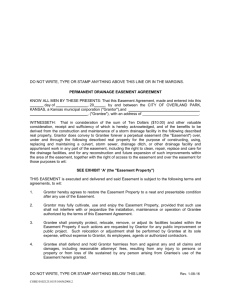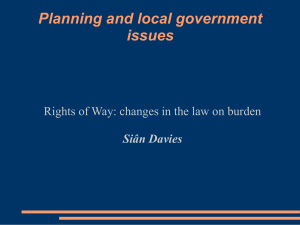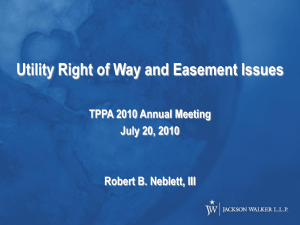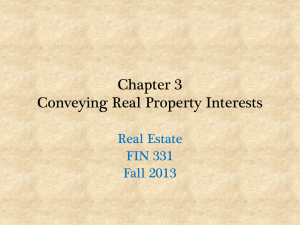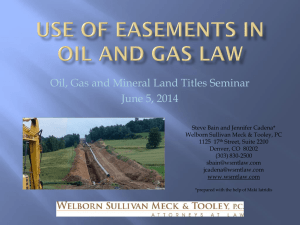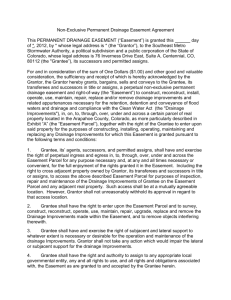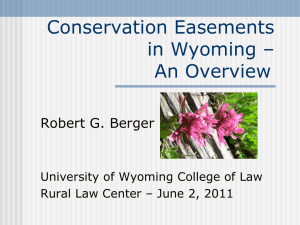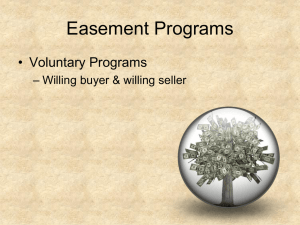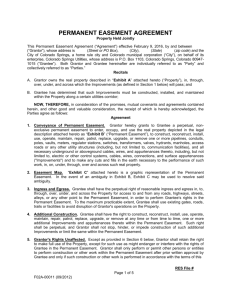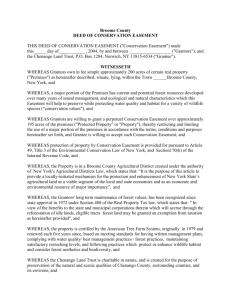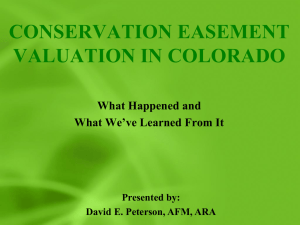Real Estate FAQ - Nichols, Jackson, Dillard, Hager & Smith. LLP
advertisement
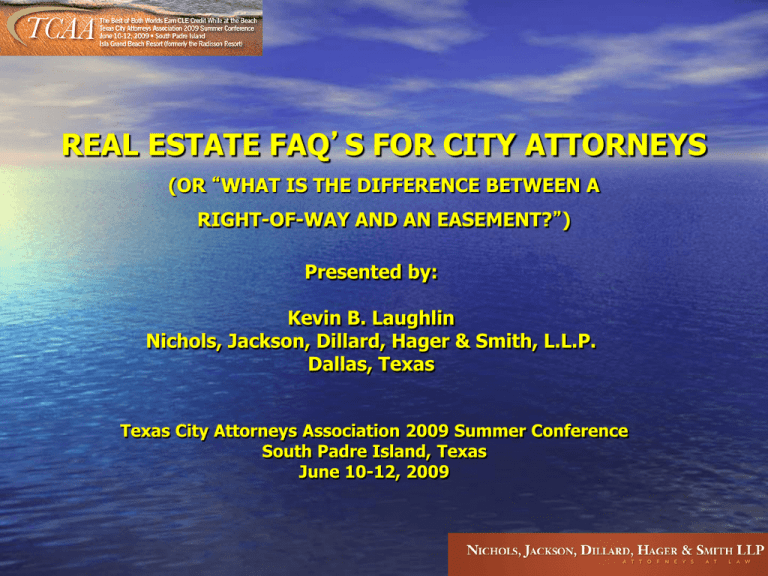
REAL ESTATE FAQ’S FOR CITY ATTORNEYS (OR “WHAT IS THE DIFFERENCE BETWEEN A RIGHT-OF-WAY AND AN EASEMENT?”) Presented by: Kevin B. Laughlin Nichols, Jackson, Dillard, Hager & Smith, L.L.P. Dallas, Texas Texas City Attorneys Association 2009 Summer Conference South Padre Island, Texas June 10-12, 2009 Question: What is the difference between a rightof-way and an easement? ANSWER: As a general premise…… NOTHING! City Engineer: We have a new waterline for a development on the west side that needs to cut across Farmer Jones’ acreage. Can you prepare a right of way agreement for me? City Attorney: Sounds like you need a utility easement. I’ll get started on it. City Engineer: No, I said a right of way! This is for a pipeline, and I need a right of way for it! City Attorney: Fine. I will prepare a document that will get you the right to build the line. Easement does not convey full title Non-possessory interest Holder authorized to use the owner’s property for a particular purpose Utility, street and other public easements are usually “easement in gross” A right-of-way is merely a type of easement Question: “We have an existing easement with a 16inch water line in it. Can we replace the 16-inch line with a new 24-inch water line in the same easement?” Answer: Depends on what the easement says. YOU MUST READ THE EASEMENT! As a general premise, the grantee of an easement may only use an easement for the purposes described in the easement and those things necessary to allow the permitted use to occur. EXAMPLE…… Easement says “construction, reconstruction, repair, maintenance, replacement, or removal of a 16-inch water line….” What can we build in this easement? 16-inch water line 8-inch water line 16-inch sewer line Two 8-inch water lines Practice Tip: Write the use description as broadly as you can get away with in order to provide as much flexibility to your successors 40 years from now! …the right of ingress, egress, and regress therein, to erect, construct, reconstruct, install, replace, repair, operate, use, inspect, modify, remove and maintain certain water, wastewater, and/or other public utility lines and appurtenances, together with all lines, pipes, conduits and other facilities, equipment, improvements, and appurtenances used in connection with such said public utilities as deemed necessary thereto by said Grantee, over, along, across, under, into and through the Property. Question: There’s a fence down the middle of the drainage easement in Blackacre Estates. Can we take it down without liability? Answer: See answer to previous question! READ THE EASEMENT! The owner of the land on which an easement has been granted has the right of full use of the land not inconsistent with the reasonable enjoyment of the easement. Rhodes v. Whitehead, 27 Tex. 304, 1863 WL 2837 (Tex. 1863) The owner of the property burdened by the easement does, however, owe a duty to use his or her property in a manner that will not impair or destroy the paramount right of use allowed in the easement. Jones v. Fuller, 856 S.W.2d 597 (Tex. App. Waco 1993, writ denied). Practice Tip: Don’t depend on the common law rule to help you out with respect to conflicts between the city use of the easement and the use by the property owner. Include in the easement document specific language regarding use and removal of improvements placed there by third parties…especially the grantor of the easement! Sample Drainage Easement Language: Grantor retains all rights to the Easement Property, provided that the Grantor’s exercise of such rights does not interfere with the Grantee ’ s rights under this easement. Grantor agrees not to interfere with the Grantee’s ability to use or maintain the drainage facilities. Interference includes, but is not limited to, physically modifying the Easement Property such as altering topography; installing fences, structures, rockeries, walls or other like improvements; planting of difficult to restore landscaping; piling or storage of dirt, trash, garbage, debris or other materials. Grantor shall, upon receipt of written notice from the Grantee, remove cited interference from the Easement Property which prevents proper use of the Easement Property for the purposes intended herein. Grantee may grant written permission to the Grantor to physically modify the Easement Property upon receipt of a written request. Question: We don’t need that street any more and would like to vacate it. How do we do it, and who gets the property back? When abandoning right of way, always ask and obtain a satisfactory answer to the following questions: How was the right of way originally acquired? Who owns the underlying fee title, if not the city? If the ROW is on the edge of a subdivision, did it come wholly out of that subdivision or in part from adjacent land? Do I have a clear legal description of what is being abandoned/vacated so that it can be identified on the ground? If the property is owned in fee by the city, have I complied with all requirements, if any, of Tex. Loc. Govt. Code §272.001 regarding the sale of property? If the property was acquired through the exercise of eminent domain, is it necessary to comply with Tex. Prop. Code §21.101 regarding offering the property back to the original owner? Does the city need to retain any easement for utilities, drainage, or other purposes? After the formal action has taken place to approve vacating the ROW, has the appropriate document noting the vacation been filed in the real property records in the county clerk’s office? Question: I can pay the title company $150 to prepare an abstract certificate or a little bit more and get a title opinion from a title attorney. Do I really need an owner’s policy of title insurance? Answer: Possibly and, in many instances, probably. Abstract of Title…… is a compilation of the history of the documents affecting the title to property. IT IS NOT A TITLE OPINION!!! Attorney’s Opinion of Title… an opinion of an attorney (hopefully from an attorney who is actually experienced in examining property records) with respect to the ownership of the subject property and any defects in title. Good for updates on title previously insured, but cannot provide compensation for defects in title learned of later. Title insurance… protects you and your lender if someone challenges your title to your property because of title defects that were unknown when you bought the policy. Texas Department of Insurance What is the cost for title insurance? $10,000 policy (min) = $229.00 $50,000 policy = $503 $100,000 policy = $843 $500,000 policy = $2979 $1 million policy = $5649 Same premium no matter where in the state or which title company! TDI Basic Owner’s Rate Schedule: http://www.tdi.state.tx.us/orders/titlerates2004.html Basic Premium Rate Calculator: http://www.stewartnorthtexas.com/premium-rates Question: What is the difference in a special warranty deed, general warranty deed, a deed without warranty, and a quitclaim deed, and which is preferable when? General Warranty Deed – warranty of title obligates the grantor to indemnify the grantee against any loss resulting from a title defect or from any encumbrances that arose before the conveyance. Special Warranty Deed – warranty of title obligates the grantor to indemnify the grantee only as to defects in title caused by the grantor and not the grantor’s predecessors in title. Deed Without Warranty – There is no warranty of title provided by the grantor to the grantee, but at least there is a conveyance of the quality and quantity of title described in the deed. In the case of a deed without warranty, it is possible to obtain after acquired title if the grantor did not have full title to the property conveyed at the time of the conveyance, but obtains it later. Quitclaim Deed – This is not really a “deed” at all, but serves to convey to the grantee whatever interest the grantor may own on the date of the conveyance. Practice Tip: When buying property, always try to get a general warranty deed. When selling, always try to give only a special warranty deed. Never accept a quitclaim deed unless you already know you are getting good title from another source but are trying to cure a potential contingent title issue from a third party not directly involved in the transaction. However, if that third party actually owns an undivided interest in fee, that third party needs to be a grantor on a warranty deed conveying his or her undivided interest. Don’t take a quitclaim for someone’s undivided fee interest. Question: My finance office is calling me about a property tax bill we received from the tax collector’s office for property we bought in February. I thought we are tax exempt. What do we do with the bill? Answer: PAY IT!!! Take advantage of Tex. Tax Code §26.11! Additional Real Estate Issues…. Make sure you are dealing with the real owner of the property…. Make sure you have a good, full legal description of the property…. When dealing with a seller that is not an individual, check to verify the entity is in good standing to conduct business in the State of Texas…. When running a public works project owned by the city across city property, you do not need to prepare an easement…and don’t let your city engineer whine about it. When asked to prepare and/or negotiate a real estate contract, remember to ask up front…. 1. What is the name of the other party? 2. What is the other party’s address and 3. 4. 5. 6. other contact information? If not an individual, what kind of entity? Is a survey required and who pays? Is a title policy required and who pay? Who pays title company escrow fees? When asked to prepare and/or negotiate a real estate contract, remember to ask up front…. 7. Will earnest money be deposited with title company and how much? 8. What is the legal description of the property? 9. Will an environmental assessment be required and who pays? 10. How long will the inspection period be before the buyer is locked in to buying the property? 11. Is there a real estate broker involved? 12. If title policy being purchased, which title company? When asked to prepare and/or negotiate a real estate contract, remember to ask up front…. 13.Are there any special provisions relating to the transaction such a conditions to be satisfied prior to closing (plat approval or zoning change)? 14. What is the desired closing date? Kevin B. Laughlin Nichols, Jackson, Dillard, Hager & Smith, L.L.P. 1800 Lincoln Plaza 500 North Akard Dallas, Texas 75201 (214) 965-9900 (214) 965-0100 E-Mail: klaughlin@njdhs.com Firm E-Mail: njdhs@njdhs.com URL: www.njdhs.com
